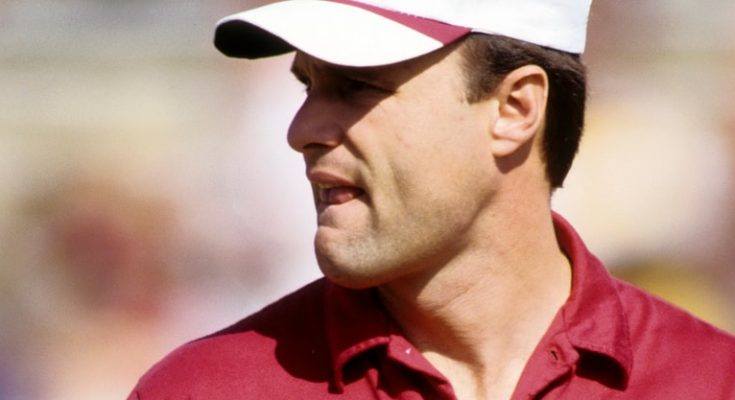Sparky Woods Reflects on His Years as a Coach and Coach of the South Carolina Gamecocks with
Sparky Woods has lived a life woven tightly with the threads of football, leadership, and the personal development of young men. Known to many as a coach and mentor, Woods’ journey through the gridiron has left a lasting impression on programs across the country, perhaps most notably during his time at the University of South Carolina. As he reflects on his years in coaching and particularly on his time as the head coach of the South Carolina Gamecocks, Woods speaks not with regret or longing, but with a quiet pride and an unmistakable sense of purpose.
When Sparky Woods accepted the head coaching position at South Carolina in 1989, he stepped into a program caught between promise and uncertainty. The Gamecocks had seen flashes of brilliance but lacked the sustained success to anchor them among the SEC’s elite. For Woods, taking on the challenge wasn’t about chasing wins or accolades, though those were always part of the equation. It was about building something with integrity and giving young athletes the tools they needed not only to succeed on the field but in life beyond the stadium.
“I came to South Carolina knowing it would be a challenge,” Woods recalls. “But I was also drawn by the people, the potential, and the pride that surrounded the program. I saw an opportunity to do something meaningful, something lasting.”
Woods inherited a team transitioning from the independent ranks into the SEC, a move that brought stiffer competition and heightened expectations. His task wasn’t just to win football games; it was to lay a foundation for long-term growth while navigating one of the most competitive conferences in the country. In his five seasons with the Gamecocks, Woods led the team through the rocky early years of that transition. His teams were known for their grit and resilience, traits that often reflected their coach’s own demeanor—measured, deliberate, and intensely focused.
The 1992 season was a defining year for Woods and the program. It marked South Carolina’s inaugural campaign in the Southeastern Conference. While the Gamecocks struggled to find consistency, finishing the season with a 5-6 record, they showed glimpses of the kind of fight and fortitude that Woods had worked to instill. The team’s dramatic 21-6 victory over Mississippi State on a cold November day felt like more than just another win—it was a message that South Carolina belonged, that they wouldn’t be pushed aside easily in their new conference home.
“We knew the SEC was going to be a tough climb,” Woods says. “But I always believed that hard work, discipline, and character would eventually win out. That season, we saw signs of that starting to happen.”
Woods speaks often of character, a word that arises not just when talking about his players, but also about the staff he worked with and the culture he tried to build. For him, coaching was never just about playbooks and game day strategy. It was about relationships. It was about understanding what made each player tick, about meeting them where they were and helping them grow into men who could handle adversity, who could lead, and who could contribute to their communities long after their playing days were done.
Some former players describe Woods as a coach who was firm but fair, a mentor who didn’t raise his voice often but whose expectations were clearly understood. He could be demanding, but he never lost sight of the bigger picture. In practices and meetings, he emphasized preparation and accountability. Off the field, he stressed education and responsibility.
“He was the kind of coach you didn’t want to let down,” one former Gamecock remembers. “Not because you were scared of him, but because you knew he cared. That kind of respect goes a long way.”
Though his tenure at South Carolina ended in 1993, Woods never saw his departure as a failure. He understood the business of college football and the high stakes that come with leading a major program. But he also understood something deeper: that legacy isn’t always measured in wins and losses. Sometimes it’s measured in the lives you impact and the values you instill.
After leaving South Carolina, Woods went on to continue his coaching journey at various programs, including stints as offensive coordinator, position coach, and eventually another head coaching role. Each stop brought new challenges and new opportunities to teach, to guide, and to serve. And through it all, the lessons he learned in Columbia stayed with him.
“I look back on South Carolina with a lot of fondness,” Woods says. “It was a time of growth—for me, for the program, and for a lot of young men. We didn’t achieve everything we hoped to on the field, but I believe we helped set the stage for those who came after.”
Indeed, many believe that Woods’ tenure helped prepare the program for the growth it would experience in the years to come. By emphasizing academic accountability, character development, and a strong work ethic, he helped elevate the standards by which the team operated. While the results may not have always shown up on the scoreboard, they resonated in the locker room and in the lives of those he coached.
Woods also remains a passionate advocate for the role of athletics in education. To him, football is a classroom in its own right, a place where lessons about perseverance, leadership, and teamwork are taught under the most intense pressure. He often speaks about the importance of giving student-athletes not just the tools to succeed in their sport, but the confidence and skills to thrive in whatever comes next.
“One of the most rewarding parts of coaching is seeing where your players end up,” he says. “Whether they go on to the NFL or into business or teaching or whatever else, knowing you played a small part in helping them become the people they are today—that’s the real win.”
Now retired from coaching, Woods has embraced the role of mentor in a broader sense. He remains connected to the game through clinics, speaking engagements, and informal advising roles. He’s become a source of wisdom for younger coaches, many of whom seek him out not just for tactical advice, but for guidance on how to lead with integrity in a profession that often demands compromise.
Woods acknowledges that college football has changed dramatically since his days on the sidelines. The advent of the transfer portal, NIL deals, and shifting conference landscapes have transformed the sport in ways few could have predicted. But at its core, Woods believes the heart of coaching remains the same.
“It’s still about people,” he says. “It’s still about building relationships, earning trust, and helping young men grow. The tools may be different, but the mission hasn’t changed.”
As he reflects on his time at South Carolina, there’s no bitterness in Woods’ voice—only gratitude. Gratitude for the players he coached, for the coaches he worked alongside, for the fans who supported the team through thick and thin. And above all, gratitude for the opportunity to serve a role larger than football itself.
“I was proud to be a Gamecock,” he says simply. “Still am. It was an honor to wear that garnet and black, and to be a small part of that program’s story.”
Woods’ coaching journey may have spanned decades and taken him across the country, but South Carolina holds a special place in his heart. It was a chapter filled with challenges, yes—but also with growth, resilience, and deep, lasting relationships. And in many ways, that’s the legacy he leaves behind: not just as a coach of the Gamecocks, but as a steward of the game, a mentor to many, and a man who never stopped believing in the power of football to change lives.



